How I Lost 60 lbs and Kept the Weight Off
At the start of 2016, I decided it was time to lose some weight and get in better shape. Since then, I lost around 60 lbs and have kept the weight off. I've had several people ask me how I did it, and while I've written about it a few times already throughout the process, I thought I might be able to pull it all together into one entry that better explains things (fair warning - I've copied fairly liberally from the earlier entries).
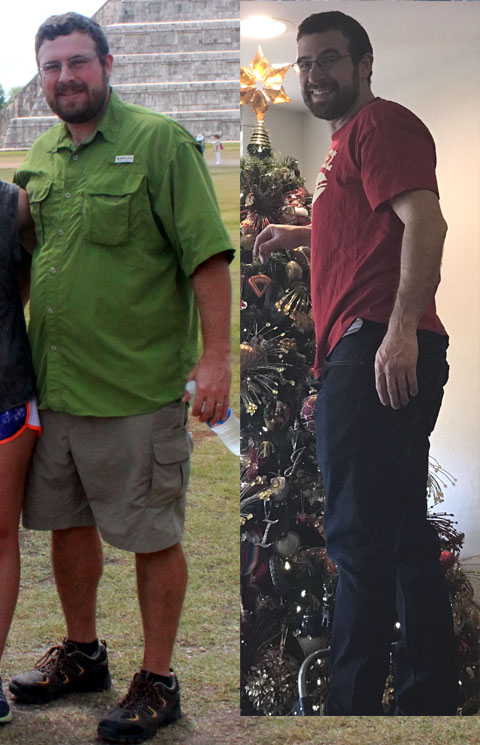
For the 'explicit' photos (i.e. no shirt), click below:
Before & After Photos - No Shirt
It's not like I have any secrets. You can find all this information other places. However, there's just so much information out there that it can get overwhelming and confusing, so I thought sharing what worked for me may be helpful for some people.
Contents
Okay, let's get these out of the way. I'm not a nutritionist or a trainer or an expert in any of this at all. I don't know if I'm doing this in the healthiest or most efficient manner, but it seems to have worked well enough for me.
I've struggled with my weight in the past, losing significant amounts of weight a few times, only to gain it back and then some. Given that I've maintained this lighter weight for over 3 years this time around, I think I've found a way that works.
I'm not suggesting this approach will be the best for everybody. I know that even for me, different strategies have worked better or worse at different points in my life, so I'm not going to pretend this is the single optimum strategy for everybody. It worked for me, but anybody looking to lose weight will need to find the best strategy for them.
Here's the short summary. I'll go into more detail on each of these things in later sections, but if you just want a quick summary to refer back to, this is it. While all of these are important and useful, I can't emphasize the first two points enough, especially the first. Counting calories was probably the single most important thing I did to lose weight.
- Count Calories
I count calories every week day. I use an app on my phone, and weigh or measure everything I eat at home to be accurate. I started off my diet limiting myself to 1500 calories per day, then pushed down to 1200-1300 calories per day. I never go less than 1200. Even now that I'm at my target weight, I limit myself to 1200-1500 calories per day on weekdays, so that I have more of a cushion to splurge on the weekends. - Weigh Yourself Daily
Don't put too much emphasis on your weight on the scale, because so many other factors besides fat loss contribute to your weight, and your weight on the scale will fluctuate quite a bit even over the course of a day. To try for the most consistent/comparable readings, I weigh myself every morning, after I've emptied my bladder, in nothing but my underwear. And even though that's not a perfect indication of my body fat percentage, the daily reminders provide good motivation. And now that I'm maintaining, it's easier to spot periods when I start to splurge a bit too much and need to get back on track. - Exercise
Exercising only helps a little in actually losing weight, but it does help a lot to get in better shape and get better toned, which is really the larger goal I was going for. Working out while dieting also ensures that most of your weight loss will be fat loss, not muscle loss. I've changed routines a couple times since starting, so find a routine that works for you, and adapt to new ones when you need to.Don't believe your FitBit, treadmill, or other exercise equipment when they say your exercise has burned a certain amount of extra calories, and then go and eat a treat that you've 'earned'. Those devices are notorious for over-predicting calories burned. I stick to my same calorie goals each day whether I exercise or not.
- Optimize Nutrition
I've simplified this down to tracking 2 macronutrients on my phone app - protein and carbs. Each day, I aim for a minimum of 130 g of carbs, which is what the FDA recommends for pretty much everybody (unless you have some type of special dietary needs). Protein is going to depend more on what types of exercises you do, but since I do a bit of strength training, I aim for 0.75 g of protein per pound of body weight (actually, I've rounded that up to 130 g of protein, just to make it easier to remember). I also try to eat a decent amount of green vegetables for vitamins. I don't specifically prohibit any foods in particular, but to meet those macronutrient goals within 1200-1500 calories, I tend to eat a lot of lean white meat (chick breast or pork loin) and minimal junk food. If I eat the wrong foods one day and I'm not going to meet those goals, I'll skimp on the protein before the carbs. - Take Days Off, but Don't Go Crazy
I don't count calories on the weekends. That's my chance to drink a few beers, eat fast food, or have a real slice of pie, so that I don't feel like I'm completely depriving myself or start building up cravings. But don't overdo it. If you go hog wild, you can still blow a week's worth of good eating in one bad weekend. I mostly just eat 'normally' over the weekend, with maybe one meal where I splurge a bit more. - Find Ways to Make it as Easy as Possible
If you want this to last, you'll have to make long term lifestyle changes. And the only way those will stick is if they're not too much of a hassle to keep up with. So, for a few examples, I'll eat single serving microwave oatmeal for breakfast, a frozen Lean Cuisine and an apple for lunch, and a pre-packaged protein bar for a snack, so that I don't have to spend a lot of time preparing and measuring those foods. For dinner, we'll cook enough on one night of the week that we can just heat up leftovers for the rest of the week. - Set Reasonable Goals / Find Motivation
I first lost most of my weight by setting a tangible goal for a specific trip. A hard date gave me something to shoot for. Otherwise, it's just too easy to let things slide. But be sure your goal is reasonable. When you're trying to lose weight, 1-2 lbs per week is a realistic long term goal. You may be able to lose more than that your first week or two, but most of that will just be having less food in your guts or retaining less water. I averaged about 1.5 lbs per week when I was losing weight.
Okay, with the short summary out of the way, let's delve a little deeper into each one of those. I'll also include some of the better references I found while doing my own research on these things.
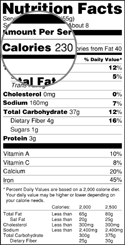 Like I wrote up above, this was probably the single most important thing I did to lose weight. I don't think most people really have a sense of how many calories are in different foods and drinks, so it's so easy to consume too many calories.
Like I wrote up above, this was probably the single most important thing I did to lose weight. I don't think most people really have a sense of how many calories are in different foods and drinks, so it's so easy to consume too many calories.
There's a seemingly simple concept that if calories burned are less than the calories you eat, you'll lose weight. That's why calorie counting can be so successful. The hard part, though, is figuring out how many calories you're actually burning, since it's affected by so many factors. You may have to adjust your calorie goal over time as your fitness level, activity level, and metabolism change.
I started off my weight loss not even paying attention to nutrition - just summing up the total calories of everything I was eating, and limiting it to 1500 calories per day. I lost 10 lbs this way before I even thought about nutrition or exercise. As I progressed, I pushed it down to 1250 calories per day. Now that I've reached my weight goal, I eat 1200-1500 calories per week day, depending on how much I've splurged over the weekend.

I use an app called My Fitness Pal (in conjunction with the Garmin app for my wrist band - there're also associated websites for those apps). It has an existing database built up by users with nutrition information for just about any food you're likely to eat. And if it's prepared food in a package, you can just scan the bar code without even having to type in the name of the food. This app is also great for keeping track of overall nutrition (see below).
As long as I'm at home, I do take the time to measure everything - either weighing it on a kitchen scale, or using measuring cups and measuring spoons. Even after doing this for a while, my eyeball isn't always real great at distinguishing 6 oz of chicken from 8 oz. Plus, it would be easy to let portion sizes start drifting larger if I didn't keep measuring them. If I'm away from home, and it's not at a restaurant with nutrition information available, then I'll just do my best to estimate the portion sizes.
Logging the foods also helps keep me from cheating. Certain foods that may just seem like little snacks can really add up if you're not careful. One cookie here (570 calories at Starbucks). A handful of sunflower seeds there (200 calories in 1/4 cup). Maybe one or two beers with dinner (230 calories per each Sierra Nevada IPA). And before you know it, you've busted your calorie goal on just snacks without even eating anything filling or nutritious.
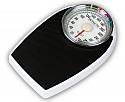 I weigh myself every morning during the week. I count Friday as my 'official' weigh-in, giving myself all week to try to make my Friday goal. I take the daily fluctuations with a grain of salt, but seeing a number every morning, and knowing in the back of my mind that I've got another weigh-in coming the next morning, and a goal by Friday, helps keep my motivation up to stick with the diet and exercise for the rest of the day.
I weigh myself every morning during the week. I count Friday as my 'official' weigh-in, giving myself all week to try to make my Friday goal. I take the daily fluctuations with a grain of salt, but seeing a number every morning, and knowing in the back of my mind that I've got another weigh-in coming the next morning, and a goal by Friday, helps keep my motivation up to stick with the diet and exercise for the rest of the day.
Since weight can vary so much throughout the day, I weigh myself in the mornings for consistency, after I've emptied my bladder, in nothing but my underwear. I figure that gives my kidneys all night to get my hydration level evened out.
To give a sense of the amount of variation, here are two figures to put this into perspective. The first is my daily weigh-ins over the first six months of losing weight (if I showed a longer time frame, it would compress the graph too much to see the daily fluctuations). There is a weekly cycle of bumps after the weekend, followed by losses over the week, but even within that cycle there's a decent amount of variation, showing why you shouldn't worry too much about the day to day changes.
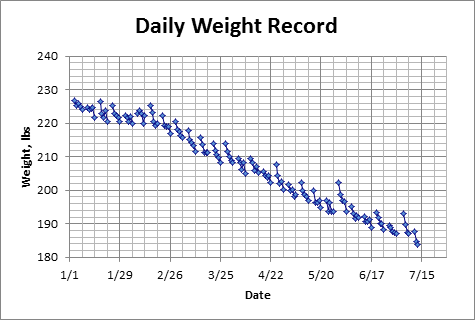
This next figure is a little 'experiment' I did a few months back, weighing myself continuously over the course of a day. The graph has one line for my total weight on the scale, and another where I subtracted the weight of my clothes to get my body weight.
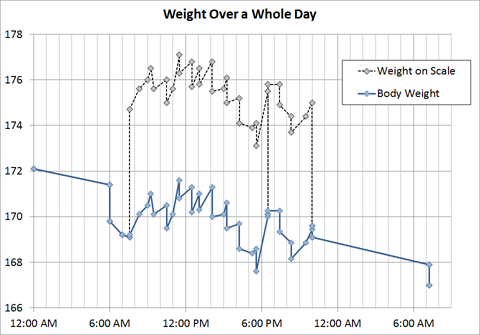
Between meals, coffee breaks, bathroom breaks, and my base metabolism, my weight varied quite a bit. Over the course of that day, my body weight varied by 4 lbs. Considering that my clothes weighed around 5 ½ lbs, my heaviest number on the scale was almost 10 lbs heavier than my lightest body weight. That's why it's so important to try for consistency in the time and conditions for when you weigh yourself, but also an important reminder of why not to stress too much over daily fluctuations.
I also have to be careful not to 'cheat' to try to get my weigh-ins down. For example, I know I could get that Friday morning weight lower if I quit drinking fluids Thursday, but then it wouldn't be an accurate representation of fat loss. It would just be a low weigh-in because I was dehydrated. Don't try tricks that would give a lower number on the scale that aren't representative of fat loss. You're only fooling yourself.
(The one 'cheat' I do allow myself is that I'll do my weigh-ins after my workout. That's an attempt to motivate me to wake up early and do the workout, offering a little 'reward' of a lower weight.)
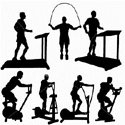 To actually get healthy and not just lose weight, you need to exercise. And any exercise is better than no exercise (for example, here's an article on the benefits of walking even if it's just an hour total a week at a moderate pace - Take A Hike To Do Your Heart And Spirit Good).
To actually get healthy and not just lose weight, you need to exercise. And any exercise is better than no exercise (for example, here's an article on the benefits of walking even if it's just an hour total a week at a moderate pace - Take A Hike To Do Your Heart And Spirit Good).
As I mentioned in the short summary, don't assume that you can necessarily bump up your calorie intake by the amount that treadmills or your FitBit say you burned during your exercise session. Here's a good article on the issue, Why you shouldn't exercise to lose weight, explained with 60+ studies. While exercise is still important, the article referenced several studies that show how your body compensates for increased physical activity by finding other ways to conserve energy. You'll probably still burn more calories exercising than not exercising, but it's a case of diminishing returns. For example, if you go from a completely sedentary lifestyle to jogging a mile a day, you'll probably see some decent benefit and burn more calories. But if you double that to two miles a day, you won't see twice the benefit. At any rate, the algorithms in fitness equipment tend to substantially overestimate how many additional calories you burn by exercising.

In fitness groups, there's a lot of debate about the benefits of strength training vs. cardio, with some people saying strength training is actually better for losing weight (Trying to Lose Weight? Here's Why Strength Training Is as Important as Cardio). At the very least, if you do strength training while losing weight, you can help ensure that most of your weight loss will be fat loss, and not muscle loss. From what I've read (e.g. How Much Strength Training Do You Really Need?), and from my own personal experience, strength training twice a week is good enough to see noticeable results.
For about a year, my wife and I went to a gym together, Planet Fitness. If a gym works into your schedule, they're great. They have all types of fitness equipment that you wouldn't find at home. My workout there was a 10 minute run on a treadmill, one trip through their 30 Minute Express Circuit the way they recommend it, then again hitting just the upper body machines without doing the steps in between, finishing up with a 5 minute cool down walk on the treadmill.
For a variety of reasons, the gym quit being a good option for us. A big one was that my elbow gets aggravated when lifting weights, so my doctor recommended using light weights at high reps. So, I switched to exercising with dumbbells at the house. I also had started running in my neighborhood and swimming laps in my pool, but a broken foot and severely sprained ankle messed up that routine, and I've been too busy with other projects since getting healthy to start that back up again.
Right now, I do upper body exercises at home twice a week, and have intermittently included a leg day and cardio day (a tweaky lower back also limits how much I can do). I do the exercises first thing in the morning, so I just roll out of bed, do my exercises, and then go get the morning shower I was going to get, anyway, skipping the extra time associated with the gym, and keeping my evenings free. And I do it all with one set of dumbbells, so it's a pretty minimal investment in equipment that doesn't take up much space in the house. They are adjustable dumbbells, at least, so that I can periodically increase the weight.
Given the considerations I have to allow for my elbow and back, and the fact that I'm not a trainer, I'm not sure how good my workout would be to others. And while I am more toned than I used to be, I don't have a physique that would turn heads at the beach, so it probably doesn't give the results some people would be interested in, either. But just in case you are curious, here's a PDF of what I do.
Note that I started at less sets for each of those exercises, then increased the sets, then periodically increased the weight after that.
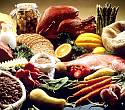 I'm not a nutritionist, but I did a lot of research that I think could be particularly helpful on this topic. There are just so many conflicting recommendations out there in the fitness subculture, and a lot of the advice from more official sources isn't necessarily geared towards people actively dieting.
I'm not a nutritionist, but I did a lot of research that I think could be particularly helpful on this topic. There are just so many conflicting recommendations out there in the fitness subculture, and a lot of the advice from more official sources isn't necessarily geared towards people actively dieting.
I haven't done any fad diets (e.g. keto, paleo, gluten free, etc.). But just by sticking to my calorie goal AND my macro nutrient goals, I pick certain types of food by default. e.g. I never specifically intended to go for a low carb diet, and I actually do have a minimum carb goal, but because high carb foods also tend to be high calorie foods, I've drastically reduced the amount of carbs I eat. (i.e. Dinner now might include 3 oz of roasted potatoes, rather than a plate piled high with mashed potatoes and a couple dinner rolls to go along with it.)
Protein
Protein is a huge discussion in the fitness subculture, especially if you're researching strength training. There's a rule of thumb that way over-estimates how much protein most people need - 1 gram per pound that you weigh (i.e. a 180 lb person would need 180 g of protein per day). The best discussion I found for protein requirements was this article, The Myth of 1 g/lb: Optimal Protein Intake for Bodybuilders. Even though it focused on bodybuilding, it looked at protein requirements for a range of athletes based on various scientific studies. Sedentary individuals only need 0.41 g/lb. Estimated requirements for athletes range from 0.64 to 0.82 g/lb. I decided to shoot for 0.75 g/lb for myself, which is probably more than I need, but still substantially lower than the 1 g/lb rule of thumb.
Carbs
I used the carb recommendations from the 2010 Dietary Guidelines for Americans (page 76). Pretty much everyone should be getting 130 g of carbs a day (I don't know enough to say anything about diabetics or other people on special diets). According to an article, Ask the Dietitian: What's the Best Carb, Protein and Fat Breakdown for Weight Loss?, "This number is based on the amount of carbohydrates (sugars and starches) required to fuel an adult's brain, red blood cells and central nervous system." In other words, it's not the type of nutrient I'd want to skimp on.
Fiber
For fiber, that same Dietary Guidelines report (page 41) recommends 38 g per day for men, and 25 g per day for women. I don't know if you've ever tried eating that much fiber, but it's a challenge. I'll be honest - I don't actually keep track of how much fiber I eat, anymore. I do eat fruits and vegetables every day, but I don't normally get 38 g of fiber.
Vitamins
Many studies show that multi-vitamins don't offer any measurable benefits for people on a normal diet, and may even increase risk in some areas (more info - Science Based Medicine - Should I Take a Multivitamin?). While I was actively losing weight, I took a multivitamin each day since my diet was so reduced. Now that I'm maintaining my weight, I quit taking multivitamins.
My doctor warned me specifically about calcium supplements, since some studies indicate that excess calcium might increase the risk of heart disease and prostate cancer (more info: Mayo Clinic: Who should consider calcium supplements?), so even when I was losing weight, I only took calcium on the days when I wouldn't meet the recommended daily amount.
If you're after potassium in particular (i.e. you're getting cramps while exercising), bananas aren't nearly as good of a source as their reputation would have you think. Vegetables, potatoes, beans, and some fruits are all better sources of potassium than bananas on a per calorie basis. Zucchini and squash are particularly good (more info: Good Sources of Potassium).
Supplements
I get most of my calories from real food and a balanced diet, but I will have a few protein based snacks throughout the day to help me hit my protein goals, and to spread the protein throughout the day rather than loading up in one meal. These snacks consist of a low calorie protein drink with breakfast on days when I don't work out (like Protein2o or Premier Protein Clear Protein), or a bit more substantial protein drink on days when I do work out (like Muscle Milk or Premier Protein Shakes), and a protein bar for an afternoon snack (my current go-to is Premier Protein Fiber Crispy Bars, but I also like Quest Bars, and I'll at least try anything once that's on sale). Very occasionally I'll have a protein drink with dinner, but usually only to make up for the calories of a less healthy food I'm treating myself to.
Take Days Off, but Don't Go Crazy
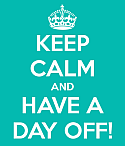 1250 calories per day is pretty low, and meeting all my nutrition goals I outlined above within that calorie count doesn't leave much freedom to eat good foods. But if I stuck to nothing but broccoli, grilled chicken, and oatmeal, I'd probably go crazy. Or, more likely, I wouldn't stick with it and I'd fall off the wagon.
1250 calories per day is pretty low, and meeting all my nutrition goals I outlined above within that calorie count doesn't leave much freedom to eat good foods. But if I stuck to nothing but broccoli, grilled chicken, and oatmeal, I'd probably go crazy. Or, more likely, I wouldn't stick with it and I'd fall off the wagon.
So, I take weekends off. I don't go crazy, because honestly I could wreck a whole week's worth of good eating with one bad weekend. On holidays and a few other special occasions, I've actually gone up over 10 lbs on the scale in one weekend. Obviously, that's not all fat, but it can take a week or two to get back to where I was before the bad weekend.
For most of the weekend, I'll just eat 'normally' without weighing all my food or logging it on the phone (e.g. eggs & bacon for breakfast, a sandwich & potato chips for lunch). I'll give myself maybe one or two meals to cheat a bit more and drink a few beers, but even then I don't pig out.
Find Ways to Make it as Easy as Possible
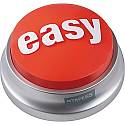 A lot of the fitness websites I read seem to assume you have all the time in the world. They talk about 'simple' lunches that only take 15 minutes to prepare - that's already half my lunch break! Or they talk about baking muffins to eat throughout the week, as if I have a lot of time for baking. So, I eat a lot of prepared foods - single serving oatmeal for breakfast, frozen Lean Cuisines for lunch, and individually packaged afternoon snacks. They're all quick and easy and already the correct portion size without having to measure things out or guess. Dinner can be a little more involved since it's at the house, but we try to make enough to have leftovers to last a few days.
A lot of the fitness websites I read seem to assume you have all the time in the world. They talk about 'simple' lunches that only take 15 minutes to prepare - that's already half my lunch break! Or they talk about baking muffins to eat throughout the week, as if I have a lot of time for baking. So, I eat a lot of prepared foods - single serving oatmeal for breakfast, frozen Lean Cuisines for lunch, and individually packaged afternoon snacks. They're all quick and easy and already the correct portion size without having to measure things out or guess. Dinner can be a little more involved since it's at the house, but we try to make enough to have leftovers to last a few days.
As far as exercising, like I already wrote, right now I do that at my own house in the mornings. The hardest part is forcing myself to wake up early, but it's still easier than setting aside time after work or heading out to a gym.
When I was going to the gym, my wife and I went together. Having a partner provides a little accountability and incentive. It's tougher to just skip when you know someone else is counting on going with you.
The point is that if you really want to lose weight and keep it off, it's not just a short term diet, but a bunch of changes you'll have to stick to for the rest of your life. And the only way I see me doing that is making everything easy enough that I'll keep on doing it. Fresh made food from scratch for every meal is unrealistic.
Set Reasonable Goals / Find Motivation
 Staying motivated might be the hardest part of this whole process. For me, setting concrete goals with a date really helped with that, especially while I was losing weight. Without a goal and a firm date for that goal, it's too easy to slip (oh, it's just a few more calories - I'll make it up next week).
Staying motivated might be the hardest part of this whole process. For me, setting concrete goals with a date really helped with that, especially while I was losing weight. Without a goal and a firm date for that goal, it's too easy to slip (oh, it's just a few more calories - I'll make it up next week).
My initial goal was to make 180 lbs before a summer vacation. I did, but after that, I kind of slacked off a bit, quit weighing myself everyday and working out twice a week, and drifted back up a few pounds. I buckled down again for a vacation the following summer, then my 40th birthday, and then started looking ahead to event after event after that. Probably the most important thing I do to maintain my weight now is to weigh myself every day - I notice pretty quickly if I start to slack off too much.
When losing weight, it's important to keep the goals realistic. I see all types of fad diets and exercise plans that promise unrealistic results. Granted, for the first week or two your weight on the scale might drop 5 or 10 lbs, but that's mostly water weight and not having quite as much food in your guts. It's not actual fat loss. Most everything I've read says that a realistic long term goal is losing 1 - 2 lbs per week. I averaged right around 1.5 lbs per week while I was losing weight.
Here's an example of a typical day's worth of meals, to give a sense of what you can eat and still meet the goals of 1200 - 1300 calories, 130 g of carbs, and 130 g of protein, while even getting a tiny dessert (0.4 oz of brownie is a very small piece, but enough to get a taste). I have left off drinks, but those are all either coffee, diet sodas, or water - all zero calorie. To be honest, I do drink a lot of coffee and diet soda.
| Breakfast | Serving Size | Calories | Carbs | Protein | Fiber |
| Oatmeal | 1 packet | 100 | 19 | 4 | 3 |
| Protein2o Drink | 1 bottle | 60 | 1 | 15 | 0 |
| Lunch | Serving Size | Calories | Carbs | Protein | Fiber |
| Lean Cuisine Glazed Chicken | 1 package | 260 | 35 | 20 | 1 |
| Granny Smith Apple | 1 apple (7.2 oz) | 116 | 30.4 | 0.9 | 4.5 |
| Afternoon Snack | Serving Size | Calories | Carbs | Protein | Fiber |
| Fiber Crispy Bar | 1 bar | 190 | 27 | 15 | 7 |
| Supper | Serving Size | Calories | Carbs | Protein | Fiber |
| Grilled Chicken Breast | 8 oz | 372 | 0 | 72.6 | 0 |
| Roast Potatoes | 2 oz | 76 | 10 | 1.2 | 1.2 |
| Steamed Broccoli | 3 oz | 35 | 5 | 2 | 3 |
| German Pickles | 3 oz | 15 | 3 | 0 | 0 |
| Optional Dessert | Serving Size | Calories | Carbs | Protein | Fiber |
| Brownie | 0.4 | 74 | 9.2 | 0.9 | 0.4 |
| Total | Serving Size | Calories | Carbs | Protein | Fiber |
| No Dessert | -- | 1224 | 130.4 | 130.7 | 19.7 |
| with Dessert | -- | 1298 | 139.6 | 131.6 | 20.1 |
I'll also mention fast food meals here. Obviously, you don't want to eat fast food a lot, but there may be times when you're on the road or out with friends, and it's the only reasonable option available. Granted, you could go for a salad or their version of health food, but if I'm at McDonald's, I want a hamburger, damnit. But, rather than order a Quarter Pounder with cheese and bacon, a large fries, and a large Coke (1440 calories, 190 g carbs, 46 g protein), I'll get a regular cheeseburger, a 4-pack of chicken nuggets, and a Diet Coke (480 calories, 44 g carbs, 25 g protein). As long as I choose reasonable items off the fast food menu, even if it'd still be tough to meet all of my normal nutrition goals for the day, at least I haven't totally blown it. (Side note: At a lot of fast food places, chicken nuggets are actually less calories than fries.)
I want to add one more note for people who may have similar appetites to mine, and think that that makes it tougher to lose weight. Even when I weighed 225 lbs, I was always hungry. I've eaten 50 buffalo wings by myself in a single sitting, and been looking for more food again a few hours later. Even before I lost weight, I wouldn't normally eat to the point of being full, but I still usually ate too many calories before stopping.
Even if it seems paradoxical, I used that to my advantage. I figured if I was going to be hungry, anyway, I might as well be hungry on 1500 calories as on 3000 calories. Granted, at first you are hungrier, but you adjust after a little while. I'm no hungrier now on a normal 1200 calorie day than I was 4 years ago on a 3000 calorie day.
I suppose that covers just about everything. It does take motivation and dedication to lose weight and get healthy, but it's definitely achievable. Hopefully this information can help out other people looking to lose weight.
